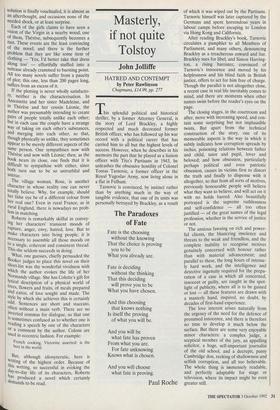Masterly, if not quite Tolstoy
John Jolliffe
HATRED AND CONTEMPT by Peter Rawlinson Chapmans, f14.99, pp. 277
his splendid political and historical thriller, by a former Attorney General, is the story of Lord Brackley, a highly respected and much decorated former British officer, who has followed up his war record with a political career that has carried him to all but the highest levels of success. However, when he describes in his memoirs the part that he played as a liaison officer with Tito's Partisans in 1943, he unleashes the obsessive hostility of Colonel Tomas Tarnovic, a former officer in the Royal Yugoslav Army, now living alone in a flat in Fulham.
Tarnovic is convinced, by instinct rather than by anything much in the way of tangible evidence, that one of its units was personally betrayed by Brackley, as a result of which it was wiped out by the Partisans. Tarnovic himself was later captured by the Germans and spent horrendous years in labour camps before escaping to London via Hong Kong and California.
After reading Brackley's book, Tarnovic circulates a pamphlet to all Members of Parliament, and many others, denouncing Brackley as a treacherous coward and liar. Brackley sues for libel, and Simon Harring- ton, a rising barrister, convinced of Tarnovic's innocence and moved by his helplessness and his blind faith in British justice, offers to act for him free of charge. Though the parallel is not altogether close, a recent case in real life inevitably comes to mind, and there are moments when other names swim before the reader's eyes on the page. The closing stages, in the courtroom and after, move with increasing speed, and con- tain some surprising but not implausible twists. But apart from the technical construction of the story, one of its memorable aspects is the way in which it subtly indicates how corruption spreads by inches, poisoning relations between father and child, tutor and pupil, lover and beloved; and how obsession, particularly perhaps political and even patriotic obsession, causes its victims first to distort the truth and finally to dispense with it altogether, so that from all sorts of motives, previously honourable people will believe what they want to believe, and will act on it with no holds barred. Also beautifully portrayed is the supreme ruthlessness and self-confidence — all too often justified — of the great names of the legal profession, whether in the service of justice or not.
The anxious fawning on rich and power- ful clients, the blustering insolence and threats to the weak and friendless, and the complete inability to recognise motives genuinely concerned with honour rather than with material advancement; and parallel to these, the long hours of intense- ly hard work, and the intelligence and detective ingenuity required for the prepa- ration of a case in which all concerned, innocent or guilty, are caught in the spot- light of publicity, where all is to be gained or lost — all these features are drawn with a masterly hand, inspired, no doubt, by decades of first-hand experience.
The love interest arises naturally from the urgency of the need for the defence of presumed innocence, and there is therefore no time to develop it much below the surface. But there are some very enjoyable minor characters: a complex judge, a sceptical member of the jury, an appalling solicitor, a huge, self-important journalist of the old school, and a decrepit, pansy Cambridge don, reeking of shallowness and selfish corruption, and all too believable.
The whole thing is immensely readable, and perfectly adaptable for stage or television, where its impact might be even greater still.


















































 Previous page
Previous page